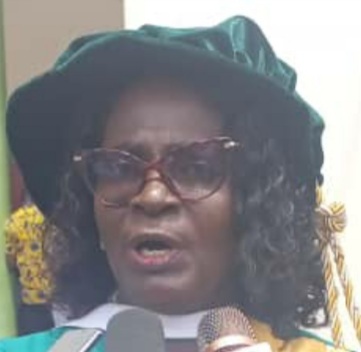The Principal of St. Louis College of Education in Kumasi, Mrs. Monica Konne Mensah, has appealed to stakeholders and policy makers, especially in the education sector, to come to the aid of the college to realise the effective implementation of its 5-year strategic plan.
She said the college was poised to ensure the effective growth and implementation of development projects under the plan, which seeks to promote an active and reflective teaching and learning environment, strengthening and improvement of ICT infrastructure, as well as providing physical infrastructure.
She stated that, the vision of the college was attracting, recruiting, developing and retraining a high-calibre of motivated staff, and improving the institutional governance system and revenue generation, as well as enforcing fiscal discipline.
She was speaking at the 18th Congregation of the College, under the theme: “Providing Quality Teacher Education to Prepare 21st Century Workforce: The Role of Colleges of Education”.
She mentioned three major projects under construction, which were a 3-storey Lecture Hall and Administration Complex, 300-bed capacity Students Hostel, funded by the Ministry of Education through the Ghana Education Trust Fund (GetFund), and a top floor staff accommodation project, being funded with its Internal Generated Fund (IGF).
Mrs. Konne Mensah revealed that the College was operating a bakery, which produces bread in commercial quantities to generate internal funds, while management, with the approval of the college council, had taken steps to procure a 40-acre plot of land at Mpehi, near Offinso, to develop a satellite campus.
The Principal of the College, however, disclosed that, the school was in dire need of funds, and appealed to stakeholders, policy makers, and the Old Students Association (SLOPSA) to support the institution accomplish the set objectives under the development.
Mr. Stephen Kwaku Owusu, Acting Deputy Director General in charge of Management Services at the Ghana Education Service (GES), reminded educationists of their major role in the government’s vision of equipping learners with the right skills needed in the 4th Industrial Revolution.
He entreated the student teachers to position themselves to receive these principles and methodologies needed to succeed in the classroom, not limiting themselves to knowledge only, but by staying innovative and creative in their professional teaching practice.
He disclosed that, the three main priorities of the education reforms were to improve learning outcomes, enhance accountability and equity at all levels of the education sector.
He noted that teachers played a critical role in transforming the education system for effective learning outcomes, hence, the government’s focus on regulating the teaching profession and fostering the development of world-class teachers to contribute to student learning and achievements through the establishment of the National Teaching Council.









